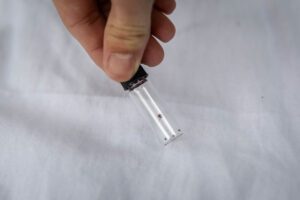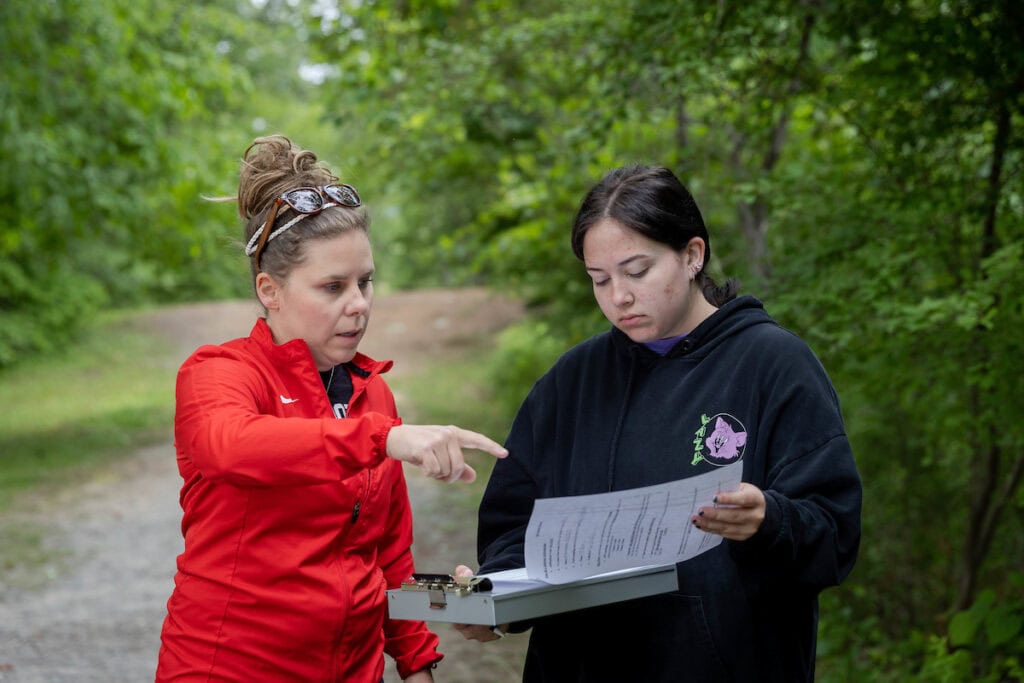Ticked off: Summer research project studying the distribution of ticks across urban landscapes
This story is part of an ongoing series featuring the work of faculty and students participating in Randolph’s Summer Research Program.

Ethan Caldwell ’25 collects ticks by dragging a piece of cloth over the ground. He and the research team visit five field sites every week to study the presence, abundance, and distribution of ticks in urban areas surrounding Lynchburg.
 Erin Heller’s summer research project studying ticks tends to attract attention.
Erin Heller’s summer research project studying ticks tends to attract attention.
“People generally don’t like ticks but are usually interested in learning about them,” said Heller, who is working with Gracie Oliver ’25 and Ethan Caldwell ’25 on the project, part of Randolph’s Summer Research Program. “We get stopped a lot when we’re in the field, with lots of different questions. And everyone has to tell you their tick story.”
The project is looking at the presence, abundance, and distribution of ticks in urban areas around Lynchburg. They’re working at five field sites spread across the city, including one on campus. Most are public parks and trails that are widely used by the general public.
“We want to see which tick species people are coming into contact with regularly,” said Heller, a biology professor.
They visit each site every week, dragging a piece of white cloth across designated areas to collect the ticks. Some days, they walk away with several dozen ticks, and others, none at all.
They also collect information about the site’s habitat—how much of the ground is covered in grass, for example, or leaf litter—and climate-based data like temperature, humidity, and the amount of light.

Erin Heller and Gracie Oliver ’25 work in the field during Randolph’s 2023 Summer Research Program.
Once the ticks are collected, Heller and her team spend afternoons back in the lab, identifying the tick species and conducting bibliographic reviews to determine what pathogens are typically associated with them.
Their work is part of a pilot project of the Ecological Research as Education Network. The project’s goal is to share results with public health agencies so medical professionals can be better prepared to diagnose and treat patients with suspected tick-borne illnesses.
“The hope is that people across the country and even citizen scientists can get involved in collecting the data,” Heller said. “The idea is to bridge the gap between this kind of ecological research and medical application. Ideally, each municipality would know what ticks are prevalent in their area and the pathogens associated with them if someone comes in with a tick bite.”
That angle is what intrigued Oliver, a biology major who plans to pursue medical school.
“I feel like we can merge those two areas with this project and see how communication can be important between someone who works in the forestry or animal industry and someone who works in the medical field,” she said.
Caldwell, also a biology major, is more interested in zoology, particularly invertebrates.
“This is a great way to get field research experience,” he said, “which I think is going to be a big part of what I want to do in the future.”
Heller invited both students to participate in the project after having them in several of her classes.
“I thought their interests were complementary to each other, the human-health component and the zoological side,” Heller said. “And for students interested in the sciences, this gives them a taste of both field and lab work.”
Tags: biology, summer research 2023, Summer Research Program
